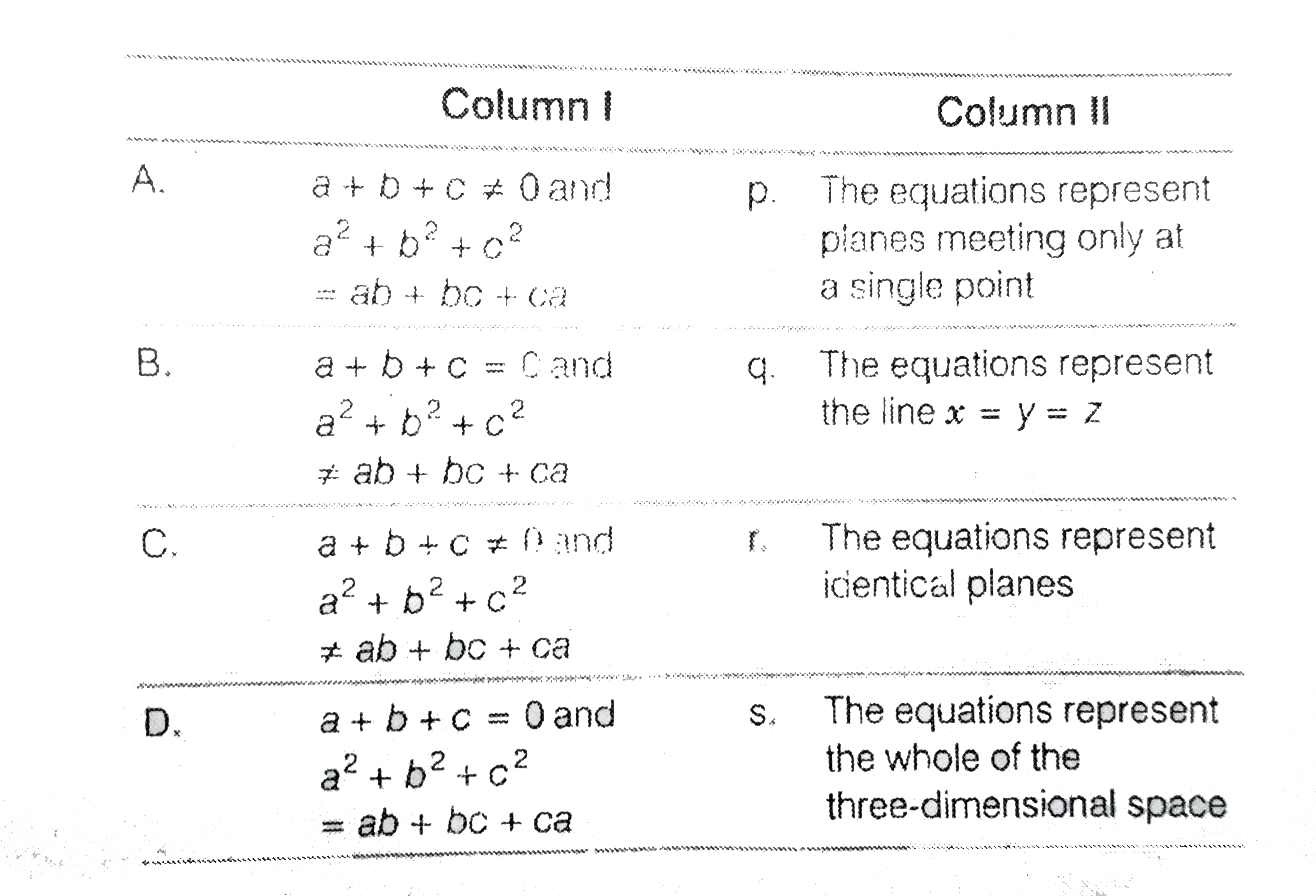STATEMENT-1 : If a,b,c are distinct and x,y,z are not all zero and ax+by+cz=0,bx+cy+az=0,cx+ay+bz=0, then a+b+c=0 and STATEMENT-2 : a2+b2+c2>ab+bc+ca, if a,b,c are distinct.
Statement - 1 is True, Statement-2 is True, Statemen-2 is a correct explanation for Statement - 1
Statement - 1 is True, Statement - 2 is True, Statement - 2 is Not a correct explanation for Statement - 1
Statement - 1 is True, Statement - 21 is False
Statement - 1 is False, Statement - 1 is True
∵ Δ=∣∣
∣∣abcbcacab∣∣
∣∣=−{a3+b3+c3−3abc}
∴ Δ=−(a+b+c){a2+b2+c2−ab−bc−ca}=0
[∵ a+b=c=0] [Non-Trivial] and a2+b2+c2−ab−bc−ca
=12[(a−b)2+(b−c)2+(c−a)2]>0
Hence, option (1) is correct.
Topper's Solved these Questions
- DETERMINANTS BOOK - AAKASH INSTITUTECHAPTER - DETERMINANTS EXERCISE - Try Yourself
12 Videos
- DETERMINANTS BOOK - AAKASH INSTITUTECHAPTER - DETERMINANTS EXERCISE - SECTION A
33 Videos
- CONTINUITY AND DIFFERENTIABILITYBOOK - AAKASH INSTITUTECHAPTER - CONTINUITY AND DIFFERENTIABILITYEXERCISE - section - J
6 Videos
- DIFFERENTIAL EQUATIONSBOOK - AAKASH INSTITUTECHAPTER - DIFFERENTIAL EQUATIONSEXERCISE - Assignment Section - J (Aakash Challengers Questions)
4 Videos
Similar Questions
Knowledge Check
If the planes x−cy−bz=0,cx=y+az=0andbx+ay−z=0 pass through a straight line, then find the value of a2+b2+c2+2abc
A2B3C0D1if a>b>c and the system of equations ax+by+cz=0,bx+cy+az0andcx+ay+bz=0 has a non-trivial solution, then the quadratic equation ax2+bx+c=0 has
Aat least one positive rootBroots opposite in signCpositive rootsDimaginary rootsIf the system of linear equations
x+2ay+az=0
x+3by+bz=0
x+4cy+cz=0
has a non-zero solution, then a, b, cAsatisfy a+2b+3c=0Bare in A.P.Care in G.P.Dare in H.P.
Consider the following linear equations
ax+by+cz=0,bx+cy+az=0,cx+ay+bz=0

View SolutionConsider the linear equations ax + by + cz = 0, bx + cy + az=0 and cx + ay + bz=0
View SolutionIf a,b,c∈Randa+b+c=0 and th esystem of equations ax+by+cz=0,bx+cy+az=0,cx+ay+bz=0 has a non-zero solution, then a:b:c is given by
View SolutionIf the system of equation ax + by + cz = 0, bx + cy + az = 0, cx + ay + bz = 0 has non-trivial solution then find the value of ∣∣ ∣ ∣∣bc−a2ca−b2ab−c2ca−b2ab−c2bc−a2ab−c2bc−a2ca−b2∣∣ ∣ ∣∣
View SolutionIf a≠b, then the system of equation ax+by+bz=0 bx+ay+bz=0 and bx+by+az=0 will have a non-trivial solution, if
View Solution
